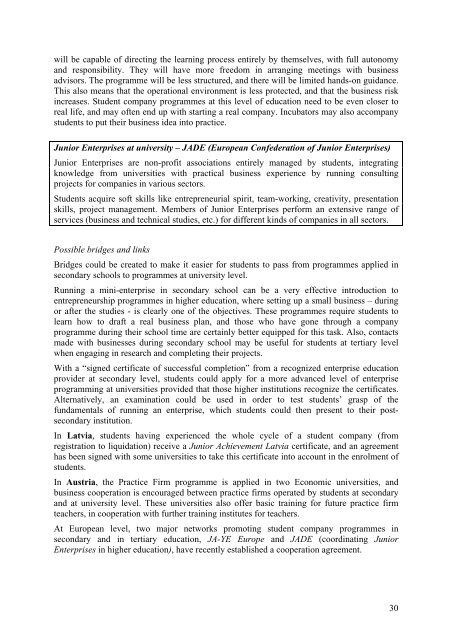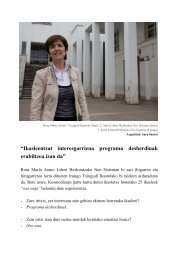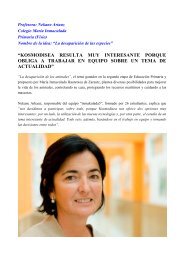Final Report of the Expert Group - European Commission - Europa
Final Report of the Expert Group - European Commission - Europa
Final Report of the Expert Group - European Commission - Europa
You also want an ePaper? Increase the reach of your titles
YUMPU automatically turns print PDFs into web optimized ePapers that Google loves.
will be capable <strong>of</strong> directing <strong>the</strong> learning process entirely by <strong>the</strong>mselves, with full autonomyand responsibility. They will have more freedom in arranging meetings with businessadvisors. The programme will be less structured, and <strong>the</strong>re will be limited hands-on guidance.This also means that <strong>the</strong> operational environment is less protected, and that <strong>the</strong> business riskincreases. Student company programmes at this level <strong>of</strong> education need to be even closer toreal life, and may <strong>of</strong>ten end up with starting a real company. Incubators may also accompanystudents to put <strong>the</strong>ir business idea into practice.Junior Enterprises at university – JADE (<strong>European</strong> Confederation <strong>of</strong> Junior Enterprises)Junior Enterprises are non-pr<strong>of</strong>it associations entirely managed by students, integratingknowledge from universities with practical business experience by running consultingprojects for companies in various sectors.Students acquire s<strong>of</strong>t skills like entrepreneurial spirit, team-working, creativity, presentationskills, project management. Members <strong>of</strong> Junior Enterprises perform an extensive range <strong>of</strong>services (business and technical studies, etc.) for different kinds <strong>of</strong> companies in all sectors.Possible bridges and linksBridges could be created to make it easier for students to pass from programmes applied insecondary schools to programmes at university level.Running a mini-enterprise in secondary school can be a very effective introduction toentrepreneurship programmes in higher education, where setting up a small business – duringor after <strong>the</strong> studies - is clearly one <strong>of</strong> <strong>the</strong> objectives. These programmes require students tolearn how to draft a real business plan, and those who have gone through a companyprogramme during <strong>the</strong>ir school time are certainly better equipped for this task. Also, contactsmade with businesses during secondary school may be useful for students at tertiary levelwhen engaging in research and completing <strong>the</strong>ir projects.With a “signed certificate <strong>of</strong> successful completion” from a recognized enterprise educationprovider at secondary level, students could apply for a more advanced level <strong>of</strong> enterpriseprogramming at universities provided that those higher institutions recognize <strong>the</strong> certificates.Alternatively, an examination could be used in order to test students’ grasp <strong>of</strong> <strong>the</strong>fundamentals <strong>of</strong> running an enterprise, which students could <strong>the</strong>n present to <strong>the</strong>ir postsecondaryinstitution.In Latvia, students having experienced <strong>the</strong> whole cycle <strong>of</strong> a student company (fromregistration to liquidation) receive a Junior Achievement Latvia certificate, and an agreementhas been signed with some universities to take this certificate into account in <strong>the</strong> enrolment <strong>of</strong>students.In Austria, <strong>the</strong> Practice Firm programme is applied in two Economic universities, andbusiness cooperation is encouraged between practice firms operated by students at secondaryand at university level. These universities also <strong>of</strong>fer basic training for future practice firmteachers, in cooperation with fur<strong>the</strong>r training institutes for teachers.At <strong>European</strong> level, two major networks promoting student company programmes insecondary and in tertiary education, JA-YE Europe and JADE (coordinating JuniorEnterprises in higher education), have recently established a cooperation agreement.30




